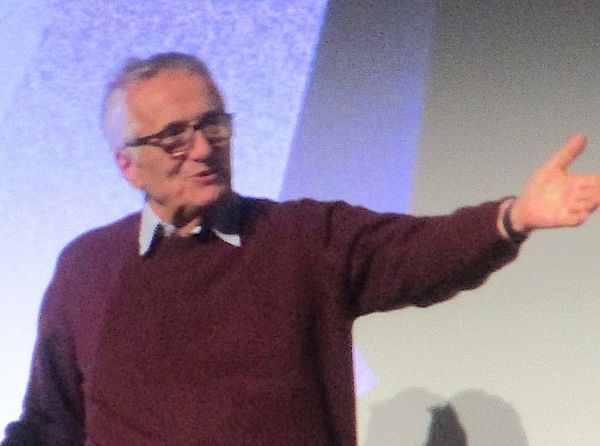Marco Bellocchio’s The Traitor (Il Traditore), co-written with Valia Santella, Ludovica Rampoldi, Francesco Piccolo, and Francesco La Licata, produced by Simone Gattoni and Giuseppe Caschetto, and starring Pierfrancesco Favino as Tommaso Buscetta, received four European Film Award nominations. Best Film (won by Yorgos Lanthimos’ The Favourite, produced by Ceci Dempsey, Ed Guiney, Lee Magiday, Lanthimos), Best Director (won by Yorgos Lanthimos), Best Screenwriter (won by Céline Sciamma for Portrait Of A Lady On Fire), and Best Actor (won by Antonio Banderas in Pedro Almodóvar’s Pain And Glory).
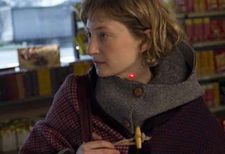 |
| Alba Rohrwacher (in Dormant Beauty) on Marco Bellocchio: “I can say he is one of my masters. He taught me a lot.” |
Before The Wonders: Alice and Alba Rohrwacher retrospective at the Museum of Modern Art in New York, Alba Rohrwacher, who starred in Bellocchio’s Dormant Beauty (Bella Addormentata) with Isabelle Huppert and Toni Sevillo, and Blood Of My Blood (Sangue Del Mio Sangue) with Roberto Herlitzka and Pier Giorgio Bellocchio, told me that she was first seen on the big screen in The Wedding Director and that he is “one of my masters. He taught me a lot.”
There is nothing alluring about the lifestyle of real-life Mafia boss Tommaso Buscetta and his family, when Marco Bellocchio takes it on, because the director never lets us forget the threat of violence, lurking around every corner, every scene. The extravagant party at the start, celebrating traditionally Santa Rosalia in Palermo in 1980, might make you think of Visconti's The Leopard in its splendour, but not for long.
Still The Traitor (Italy’s Oscar submission for the 92nd Academy Awards) is a film of breathtaking beauty. A count-up warns of assassinations to come and music soothes and heightens, in a way only Bellocchio knows how to combine. Pierfrancesco Favino gives a career-defining performance. Buscetta, after his extradition from exile in Brazil in the Eighties, and the murderous rampage by rivalling factions of his family members, decided to work together with Judge Falcone, the real hero here. Buscetta's testimony and the famous Maxi Trial changed Italy for good.
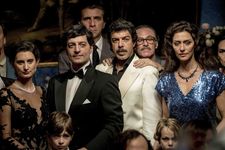 |
| Marco Bellocchio on The Traitor: “A tragedy that is both collective and familial and individual.” |
Anne-Katrin Titze: I want to start with the beginning of your film - the family celebration, the exuberance - and already we know, that this is not glamorising the Mafia. This is something different. The tension is rising. Buscetta [Pierfrancesco Favino], the protagonist, finds his son on the beach before we read: Palermo - Heroin capitol of the world.
When they dance I was reminded of Suspicion and Joan Fontaine's expression. The doom already written on her exhilarated face. Can you talk about that beginning?
Marco Bellocchio: Yes, I think the problem that you are facing making a film like this is that you are representing the Mafia with some very strong and meaningful images. At the same time you have to give the viewer information. From the start, for example, we show the whole family grouping in the family photo.
We give the names of the various characters to allow the viewer to orient his or herself in this world. A world that's very lugubrious, that's grim, that's sad. As if I wanted to prepare the viewer for this future tragedy that's going to take place, not only for Buscetta but for the many people who then lost their lives, who were killed by the Mafia.
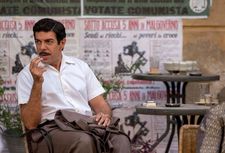 |
| Pierfrancesco Favino as Tommaso Buscetta in Marco Bellocchio’s The Traitor |
AKT: You are preparing us.
MB: What that combined also in this first scene is the relationship between Buscetta and his various bosses but also a crisis in his relationship to his son, who is a heroin addict. In that moment we find a concentration of both - a tragedy that is both collective and familial and individual.
AKT: There are scenes where we are not exactly certain whether what we see is a fantasy, a dream, or a reality. And it doesn't matter.
MB: It doesn't matter.
AKT: I am thinking for instance the scene with the helicopters. For people who are not in this kind of life, this is almost unimaginable. That he is watching his wife dangling in mid-air. You present this with music and Rio and the beautiful nature at the same time!
MB: That's very much the style of the whole film. Everything is based upon true things that actually happened, real events that we then transformed. For example, the scene of the wife being dangled from the helicopter, that actually happened. But we then transformed it, a process we followed throughout the film.
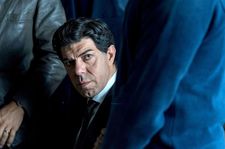 |
| Marco Bellocchio on Tommaso Buscetta (Pierfrancesco Favino): “He was a very vain man and he cared very much about his appearance …” |
Unlike the great tradition of American Mafia movies and their use of imagery, like Coppola and Scorsese, here all characters are true characters and events that actually happened that we then manipulated or re-elaborated. So all of them are rooted in reality.
When Buscetta goes to trial for example, you see that procession of workers carrying posters saying "Long live the Mafia!" or "Up with the Mafia! The Mafia gives us jobs". This actually happened. But what we do in the film is emphasise, I wouldn't say exaggerate, but emphasise, put into relief moments like that.
AKT: About the emphasis, yes, for example, I have never seen an image like the one you present here - the fact that we are inside the car with Falcone [Fausto Russo Alesi]. It totally takes your breath away. That you dare to go into the car with him!
MB: That was a stylistic choice that I made. Of course with the new digital technology that we have available, we were able to add some things after. But the point of view of the shot is inside the car of Falcone, shot within a single frame, with a single focus.
AKT: Another choice you made is about Buscetta's vanity. There is a moment where he is painting his hair, where he becomes Aschenbach. Out of Thomas Mann's Death In Venice.
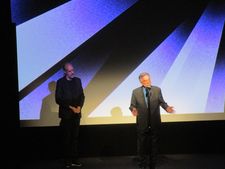 |
| Kent Jones with Francis Ford Coppola as he presents a special screening of The Cotton Club Encore at Alice Tully Hall during the 57th New York Film Festival |
MB: But he's the opposite, he really liked women in that sense.
AKT: Ultimately, though, the two overlap.
MB: Yes, you're very good. That's a very stark observation. He was a very vain man and he cared very much about his appearance and when he began to collaborate as a state witness, he demanded that he'd be provided with very elegant suits. He constructed this image. Keeping in mind that he was an ignorant man, he was not very refined, but he wanted to have these very nice clothes.
He wanted to have these luxury accessories. In real life he did. And It wasn't just about building this image. It was his vanity. He dyed his hair. And in his life he subjected himself to plastic surgery at different times. Both, to hide his identity but also to look younger.
AKT: Which is perfect because the actor, Pierfrancesco Favino, of course, stays the same age. And you can just say it's plastic surgery.
MB: Do you remember the scene when he is in this tailor shop?
AKT: Yes.
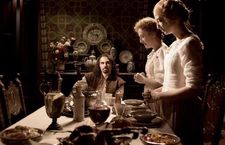 |
| Alba Rohrwacher in Marco Bellocchio’s Blood Of My Blood (Sangue Del Mio Sangue) |
MB: This is the actual tailor shop.
AKT: Where he runs into Andreotti [Giuseppe Di Marca]?
MB: Yes. It's the most prestigious tailor shop in Rome. Where all the politicians and the actors and giants of industry go. He demanded that he have that level of elegance.
AKT: What's the name of the shop?
MB: Sartoria Caraceni. Kissinger went there, Gianni Agnelli, it's very expensive there.
The Wonders: Alice and Alba Rohrwacher remaining screenings of Marco Bellocchio films.
Sangue Del Mio Sangue (Blood Of My Blood): Tuesday, December 10 at 4:00pm - Titus Theater 2.
Bella Addormentata (Dormant Beauty): Tuesday, December 10 at 7:00pm - Titus Theater 2.
The Wonders: Alice and Alba Rohrwacher retrospective is organised by Museum of Modern Art Department of Film Curator Josh Siegel with Camilla Cormanni and Paola Ruggiero of Luce Cinecittà and runs through December 23 at the Debra and Leon Black Family Film Center.
The shortlist of ten Best International Feature Films will be announced by the Academy of Motion Picture Arts and Sciences on December 16.
The Traitor is scheduled to open on January 31, 2020 in the US.








